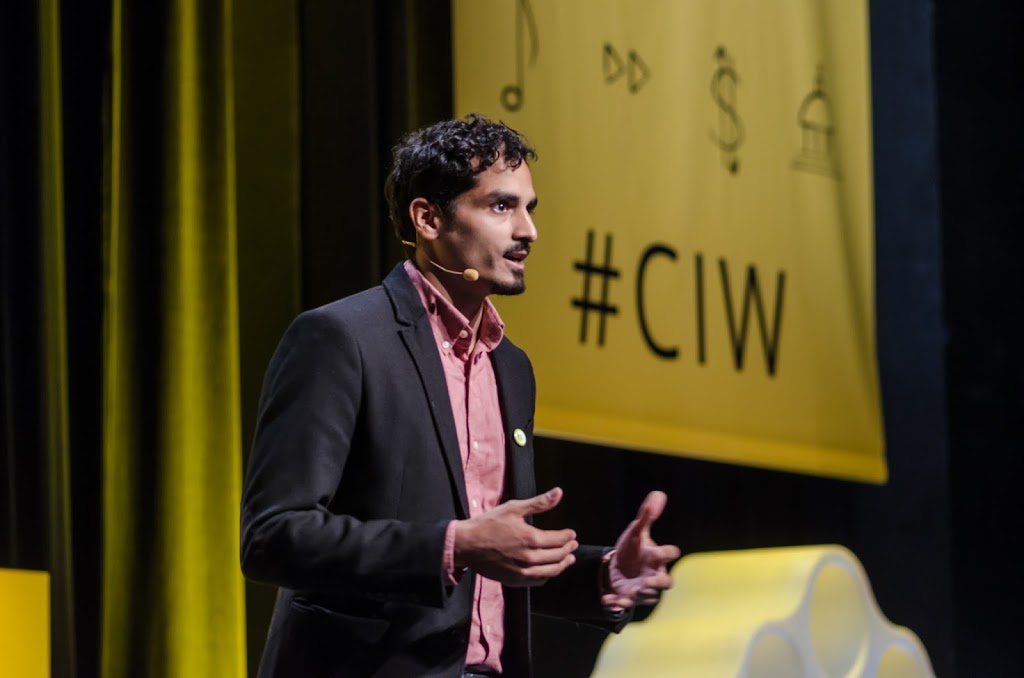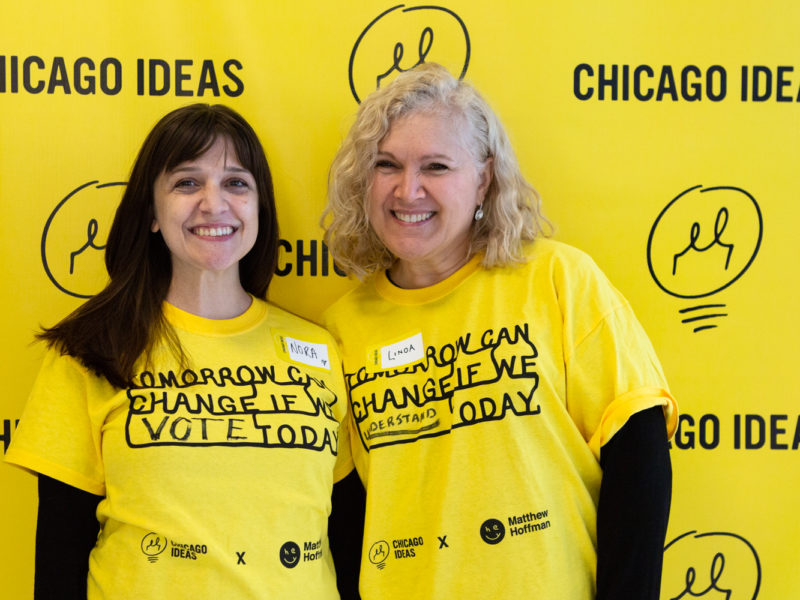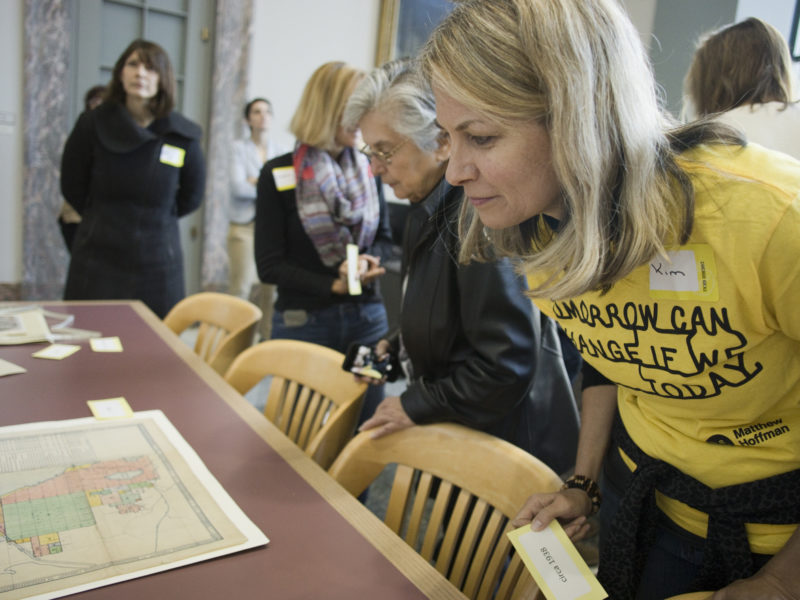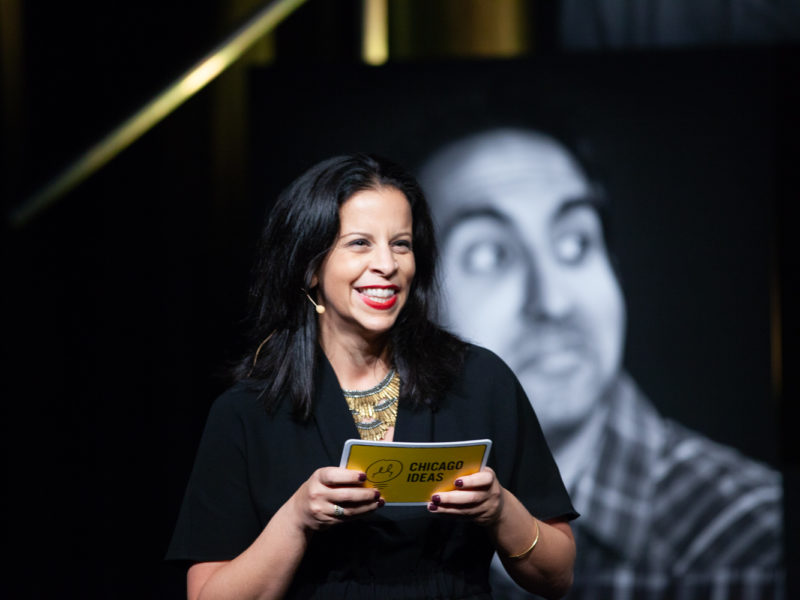
Meet the Stars of Chicagoland: CIW Co-op Member and Speaker Imran Khan
CIW Co-op Member and 2013 speaker Imran Khan has been providing unique educational opportunities to Chicago’s low-income students since he started teaching at Englewood’s Harper High School five years ago. His organization, EMBARC, takes low-income students to communities they may otherwise not have access to, providing students a concrete view of what they can achieve. Now serving hundreds of students across the city, EMBARC is shown as a positive force for social change in this Thursday’s episode of CNN’s Chicagoland. Khan talked to us about how he hopes organizations like EMBARC can break Chicago’s cycle of violence and poverty.
 |
| Imran Khan took the CIW stage to describe EMBARC’s experiential approach to education. |
Chicagoland points to EMBARC as an organization that is helping build bridges across communities in a city that, CNN points out, is plagued by gun violence. What role do you think EMBARC plays in changing Chicago for the better?
Part of what Chicagoland was doing was to address some of the serious issues that Chicago faces. Basically, what’s happening in the city and how is it moving forward. Who are the major [players] in the city in creating a brighter future for the city?
One of the things [EMBARC brings] is that we are looking at education in a new lens. So, as we look at our city’s future and we think about all of our city’s issues and problems—especially violence and crime—and we ask ourselves, “What is the root cause of these problems? Why are they occurring? How do we break the cycle?” I think EMBARC adds a very important element to that conversation when it says that in order to break that cycle, we need to start with access to opportunity. We need to start with desegregating the city. We need to start with giving kids a pathway to connect with different communities and members throughout the city. What we do is bring an action plan by working directly in the schools and providing students direct access to different partners throughout the city so they can have those experiences that will catapult them to become successful. But it also allows all members of the city of Chicago to have those very important experiences meeting those students and traveling to those communities so that they can understand what are the real issues facing our students and how they can help. Primarily, I think one of the most important things that we’ve done out there is prove that the desire to be successful is universal. The opportunity to be successful is not. Through the work of bridging communities and creating more interactions, we are not just proving out that experiential education is one of the fastest ways to get low-income kids to become successful, but we’re also proving that experiential, community-driven education is one of the fastest ways to build a stronger, collective social fabric.
So we take that [philosophy] and turn it into an action plan. We’re doing it while we’re talking about it.
What effect did Chicago Ideas Week have on EMBARC’s ability to put its philosophy of experiential education into action?
Chicago Ideas Week has been an enormous platform and springboard for us. It’s connected us to the Chicago community. We’ve gained board members, we’ve gained funding and we’ve met some really important advocates and ambassadors. They have given our work a platform to reach an audience and for the city to become aware of some of the important work we’re doing in some of these far-off places that are not so far off.
What do you think of Chicagoland’s take on our city?
There’s been a lot of press around [violence in Chicago]. Then you have Chicagoland which has a similar look in presenting the context and the challenges that are being faced and people who are looking to do something about it. I think oftentimes the conversation is left at, “Hey, look at all these intense challenges that the city faces. Look at all these intense challenges that these kids are facing and these people are facing.” I think that is such a really powerful context and allows people to understand the problem, but once you understand the problem, you need to move to the solution phase. So, I think it’s important to do things like highlighting particular organizations or particular interventions or particular people that are working really hard to make a change. I think that oftentimes some of that can be overshadowed by the intensity of the disparity [among people in Chicago], and it makes it almost seem impossible.
Chicagoland depicts many of our city’s problems—gun violence, a lack of access to equal educational opportunities, etc. Given that, what is your hope for Chicago moving forward? What would you like to see change?
I think we have seen tremendously powerful things happen when our city comes together. I think we see amazingly powerful things happen when two individuals from opposite spectrums of the social and economic strata come together, share experiences, share life stories and build and work together. We’ve seen tremendous things happen from that connection. One of the things I want to see especially—not just for Chicago but throughout our country—is the breaking down of these barriers and silos that keep us isolated and separated and that divide our communities. If we are going to call all of our neighborhoods “Chicago,” then all of it should get the attention. All of us should have the opportunity. All of us should have the access that every other part might have. There should not be disparity, and we should be building and working toward that future. In that essence, we need an action plan, and we need it to be actually executed and measured, proven and then scaled. So one of the things I want to see is equity. When I talk about equity, it’s economic, it’s social and it’s everybody have the right to design our future as a city all together.
Q&As are edited for clarity and length.




